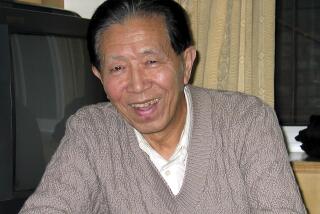Lin’s Case Attracts Conspiracy Theories
- Share via
Military hero, commander of the People’s Liberation Army, compiler of Mao’s “Little Red Book” of quotations, Lin Piao was China’s second most powerful man when, according to the official Chinese government version, he fled China on a British-built Trident jet on Sept. 12, 1971.
The official version, released months after Lin Piao’s disappearance, was that the Chinese leader and his powerful wife, Ye Qun--who was also a Politburo member--and their playboy son, Lin Liguo, were killed in the crash after their plane ran out of fuel over the Mongolian steppe. In the haste to depart from the airport near the beach resort town of Beidaihe, there had not been time to refuel the aircraft.
According to other accounts, however, Lin was never on the plane that fateful night. This theory was supported by reports in the Soviet press that none of the nine charred bodies found in the wreckage was more than 50 years old; Lin was 64.
Some conspiracy theorists claimed Lin had already been assassinated by Mao Tse-tung loyalists in an ambush and never made it on the plane. The most prominent of these accounts is the 1983 book “The Conspiracy and Murder of Mao’s Heir,” supposedly written by a Chinese official under the pseudonym Yao Ming-le and published first in the United States by Alfred A. Knopf Co.
According to the Yao Ming-le version, after uncovering an assassination plot against him by Lin and his family, Mao invited Lin Piao and his wife to a sumptuous dinner on Sept. 12, 1971, at Mao’s Jade Tower Mountain villa outside Beijing.
Along with Chinese Premier Chou En-lai and Mao’s wife, Jiang Qing, Lin and wife reportedly feasted on meat from freshly killed Manchurian tigers and sipped 482-year-old wine from a Ming porcelain vessel. Afterward, Mao had the couple’s car blasted with ground-to-ground missiles on the road leaving the villa.
Some even claim that Lin survived the air crash, only to die years later in a Soviet safehouse.
A fictionalized account featuring the Lin Piao case, “Chinese Assassin,” by British novelist Anthony Grey, is what Peter Hannam said first inspired him to investigate Lin’s death after a year struggling to survive as a free-lance journalist in Ulan Bator, Mongolia’s bleak capital city.
More to Read
Sign up for Essential California
The most important California stories and recommendations in your inbox every morning.
You may occasionally receive promotional content from the Los Angeles Times.













